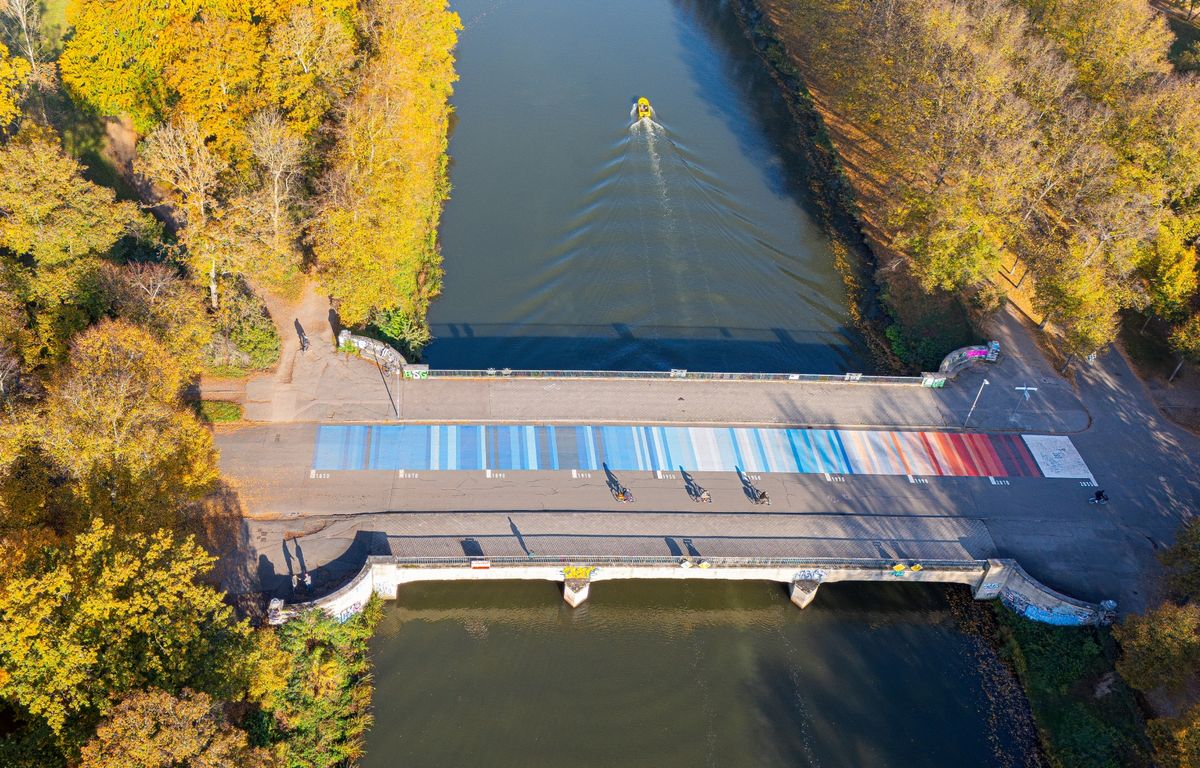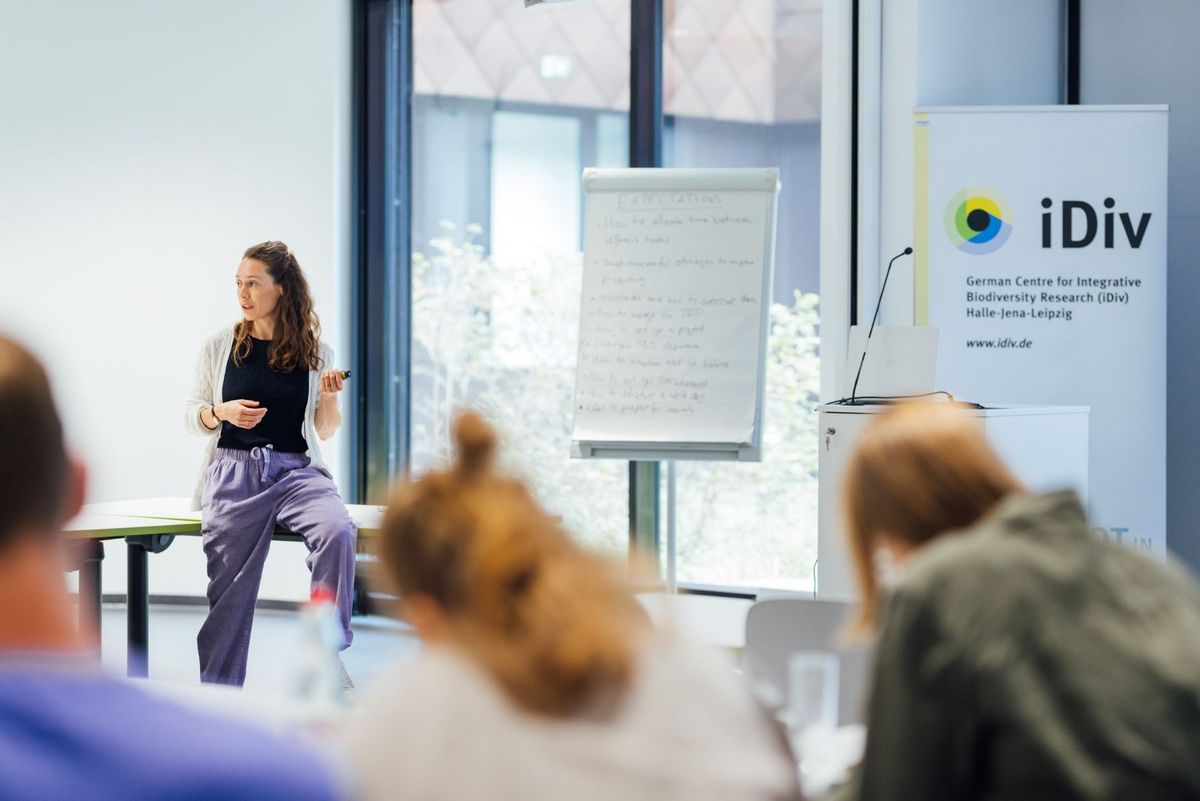Sustainable Principles for Life and Health is a strategic research field at Leipzig University dedicated to researching global challenges in the areas of climate and biodiversity. Researchers are working on ground-breaking projects to better understand the interactions between climate change and biodiversity, and to promote biodiversity conservation. Interdisciplinary approaches and international cooperation make Leipzig a central hub for research, innovation and sustainable solutions.
Programmes and collaborative projects
The following are the most important collaborative projects in the field of Sustainable Systems and Biodiversity:
- Breathing Nature
Climate change and biodiversity loss are two of the most pressing challenges facing humanity. Breathing Nature deals with the complex ways in which these two crises interact. These are symbolised by the metaphor of nature breathing: there is a continuous exchange of energy, water, gases and particles between the biosphere and the atmosphere. Human behaviour can be a driver or mitigator of biodiversity and climate change. An interdisciplinary approach encompassing climate, biodiversity and social sciences is being used to effectively address the links between climate change and biodiversity, putting their complex interactions at the heart of the analysis of human behaviour.
Learn more
- Remote Sensing Centre for Earth System Research (RSC4Earth)
The centre is a joint institution of Leipzig University and the Helmholtz Centre for Environmental Research (UFZ). The RSC4Earth brings together Leipzig’s research activities in the field of remote sensing in earth system sciences and biodiversity research. In particular, researchers study the dynamics of ecosystem and water resource dynamics in the context of global change across spatial and temporal scales.
Learn more
- German Centre for Integrative Biodiversity Research (iDiv) Halle-Jena-Leipzig
Spokesperson at Leipzig University: Professor Martin Quaas (Faculty of Economics and Management Science)
In collaboration with the Martin Luther University Halle-Wittenberg (MLU), the Friedrich Schiller University Jena (FSU) and Leipzig’s Helmholtz Centre for Environmental Research (UFZ), our university is currently home to the German Centre for Integrative Biodiversity Research (iDiv) Halle-Jena-Leipzig. Since 2012, researchers from more than 30 nations have been investigating the largely damaging influence of human activity on fauna and flora, developing a scientific basis for the sustainable stewardship of our planet’s biodiversity.
Learn more - CRC/Transregio 172: Arctic Amplification
Spokesperson: Professor Manfred Wendisch (Faculty of Physics and Earth System Sciences, Institute for Meteorology)
With CRC/Transregio 172, we are conducting systematic large-scale research in the field of Arctic climate change (AC)³ for the first time in Germany. Applying a variety of different methods, the aim of the wide-ranging research alliance with the University of Bremen, the University of Cologne, the Alfred Wegener Institute and the Leibniz Institute for Tropospheric Research is to observe climatic changes in the Arctic over long periods of time. On the basis of observations of measuring instruments on satellites, aircraft, airborne balloon platforms and research vessels, but also the results of selected ground-based monitoring stations, the researchers are improving the reliability of models for predicting the warming already recorded in the Arctic.
Learn more - Research Training Group 2939: Economics of Connected Natural Commons: Atmosphere and Biodiversity (ECO-N)
Spokesperson: Professor Martin Quaas (Faculty of Economics and Management Science and iDiv)
RTG 2939 is developing an integrative perspective on the sustainable use of natural commons in the areas of atmosphere – namely aerosols, regional climate and urban air – and biodiversity – namely forests and soils.
Learn more - Research Training Group 2324: Tree Diversity Interactions (TreeDi)
Spokesperson: Professor Helge Bruelheide (Martin Luther University Halle-Wittenberg, Institute of Biology and iDiv)
Based at the German Centre for Integrative Biodiversity Research (iDiv) Halle-Jena-Leipzig, IRTG 2324 is investigating together with the University of Chinese Academy of Sciences (UCAS) in China, how tree-tree interactions in local neighbourhoods relate to the observed positive tree species richness effects on key ecosystem functions. The international qualification programme provides for intensive Chinese-German cultural exchange during a six-month research stay in the partner country. There is also a joint doctoral candidate advisory committee with Chinese and German project leaders and close cooperation with leading figures of biodiversity research.
Learn more - Research Unit 5000: Biotic Interactions, Community Assembly, and Eco-Evolutionary Dynamics as Drivers of Long-Term Biodiversity–Ecosystem Functioning Relationships
Spokesperson: Professor Nico Eisenhauer (Faculty of Life Sciences and iDiv)
The central aim of FOR 5000 is to find out what mechanisms influence the relationship between biodiversity and ecosystem functions in the short and long term. To this end, it is applying new experimental and analytical methods in one of the world’s longest-running biodiversity experiments: the Jena Experiment. Professor Nico Eisenhauer leads the research group, which is an interdisciplinary team of ecologists, biochemists and microbiologists.
Learn more - Priority Programme 1294: Atmospheric and Earth System Research with the “High Altitude and Long Range Research Aircraft” (HALO)
Spokesperson: Professor Manfred Wendisch (Faculty of Physics and Earth System Sciences)
SPP 1294 has been funded by the DFG since 2007. The HALO research aircraft is used to study atmospheric and geophysical processes. The focus is on answering questions of climate and environmental science.
Learn more - Priority Programme 2361: On the Way to the Fluvial Anthroposphere
Spokesperson: Professor Christoph Zielhofer (Faculty of Physics and Earth System Sciences, Institute for Geography)
SPP 2361 explores the interactions between human societies and pre-industrial floodplains in Central Europe. The core research question of this Priority Programme is the extent to which humans have had an influence on changes to floodplains, and since when. Leipzig University, the University of Tübingen and the Technical University of Darmstadt developed the framework programme together.
Learn more
- ERC Starting Grant: “Forest vulnerability to compound extremes and disturbances in a changing climate”
Project director: Professor Ana Bastos (Faculty of Physics and Earth System Sciences, and iDiv))
Learn more - SOLO – Soils for Europe
Coordinator: Dr Carlos António Bastos de Morais Guerra (iDiv)
Learn more
Federal Ministry of Education and Research
- ZK-FA – Faktencheck Artenvielfalt
Project director: Professor Christian Wirth (Faculty of Life Sciences, Institute of Biology and iDiv)
Learn more - ValuGaps – Comprehensive Valorization of Natural Capitals in Germany: Approaches and Methods for Dealing With Scarce Information and Uncertainties
Project director: Dr Jasper Nikolaus Meya (iDiv)
Learn more - ScaDS.AI – Center for Scalable Data Analytics and Artificial Intelligence Dresden/Leipzig
Scientific coordinator: Professor Wolfgang E. Nagel (TU Dresden)
Deputy: Professor Erhard Rahm (Faculty of Mathematics and Computer Science, Institute of Computer Science)
Learn more - marEEshift – Marine Ecological-Economic Systems in the Western Baltic Sea and Beyond: Generic Models, Coordination and Communication
Project director: Professor Martin Quaas (Faculty of Economics and Management Science, Institute for Resource Management and iDiv)
Learn more - T!Raum-Initiative: ReWass – Regional Development and Water Management Under Water Scarcity
Project director: Dr Stefan (Faculty of Economics and Management Science, Institute for Infrastructure and Resource Management)
Learn more - Junior research group: MultiplEE: Sustainable Deployment of Renewable Energies with Multiple Environmental impacts – Policy Strategies to Address Environmental Trade-Offs of the German Energy Transition
Project director: Dr Paul Lehmann (Faculty of Economics and Management Science, Institute for Infrastructure and Resource Management)
Learn more
Federal Ministry for the Environment, Nature Conservation, Nuclear Safety and Consumer Protection
- Lebendige Luppe – Promoting Ecosystem Services and Biodiversity Through Floodplain Revitalization in an Urban Context
Project directors: Professor Sylke Nissen (Faculty of Social Sciences and Philosophy, Institute of Sociology); Professor Christian Wirth (Faculty of Life Sciences and iDiv)
Learn more
- Leibniz ScienceCampus BioSmoke
Spokesperson: Professor Ina Tegen
The Leibniz ScienceCampus “Smoke and Bioaerosols in Climate Change (BioSmoke)” investigates the links between forest fires and climate change. Partners are the Leibniz Institute for Tropospheric Research (TROPOS), the Helmholtz Centre for Environmental Research (UFZ), the German Biomass Research Centre (DBFZ) and Leipzig University.
Learn more
- VW Foundation Call for Proposals, Earth System Sciences – CASCADE
Cascading impacts of climate extremes: new perspectives for interlinking Earth System Sciences in Leipzig
Project directors: Professor Miguel Mahecha, Dr Mariana de Brito
The overarching goal of CASCADE is to provide a systemic perspective on the spread of the societal impacts of floods and droughts in Europe. The project aims to investigate how the impacts of extreme weather and climate events are amplified and how domino effects take hold across different economic sectors and systems. This includes the impacts on forestry, health, tourism, agriculture and critical infrastructure. The main social and physical driving forces of these impacts will also be identified.
- Gottfried Wilhelm Leibniz Prize
Professor Nico Eisenhauer (2021) - Heinz Maier-Leibnitz Prize
Junior Professor Sebastian Sippel (2024)
Professor Nico Eisenhauer (2014) - Bernd Rendel Prize
Junior Professor Sebastian Sippel (2017)
Professor Miguel Mahecha (2008) - Leipzig Science Prize
Professor Christian Wirth (2022) - European Geosciences Union – Outstanding Early Career Scientist Award
Professor Ana Bastos (2022)
Junior Professor Judith Kretschmer (2022) - Heisenberg fellowship
Professor Immo Fritsche (2011) - Emmy Noether Junior Research Group
Professor Nico Eisenhauer (2014)
Professor Johannes Quaas (2004) - European Research Council Grants
Professor Ana Bastos (2022)
Professor Nico Eisenhauer (2016)
Professor Johannes Quaas (2012) - Max Planck Fellow
Professor Christian Wirth - Max Planck Minerva Fast Track
Professor Pöhlker (2018)
Participating faculties and research centres
- Faculty of Life Sciences
- Faculty of Chemistry and Mineralogy
- Faculty of History, Art and Area Studies
- Faculty of Mathematics and Computer Science
- Faculty of Physics and Earth System Sciences
- Faculty of Social Sciences and Philosophy
- Faculty of Law
- Faculty of Economics and Management Science
- Centre for Biotechnology and Biomedicine (BBZ)
- German Centre for Integrative Biodiversity Research (iDiv) Halle-Jena-Leipzig
- Remote Sensing Centre for Earth System Research
Partners in research
- Deutsches Biomasseforschungszentrum (DBFZ)
- Fraunhofer Center for International Management and Knowledge Economy (IMW)
- Helmholtz Centre for Environmental Research (UFZ)
- Leibniz Institute of Surface Engineering (IOM)
- Leibniz Institute for Tropospheric Research (TROPOS)
- Max Planck Institute for Evolutionary Anthropology (MPI EVA)
- Max Planck Institute for Biogeochemistry (MPI BGC)
- Max Planck Institute of Geoanthropology (MPI GEA)































































